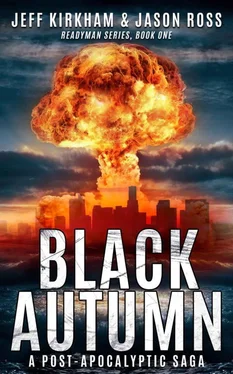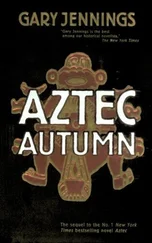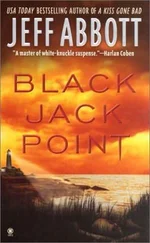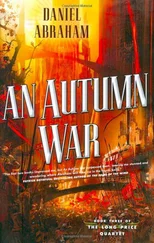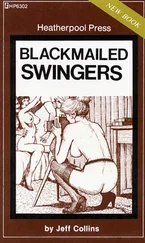As fighting-age men, both Njay and Miguel had also picked up English words related to jihad : military terms, praises to God, expressions of faith and the particulars of weapons and explosives.
When the radio announcer mentioned that a nuclear dirty bomb had been detonated in Saudi Arabia, both men knew enough English to grab their attention. But the radio station returned to its top-forty music before either could make sense of the news. Njay scrambled up, his stomach reeling, and pattered over to the radio. He turned the dial until he found a proper news channel. The two men listened intently for the next forty-five minutes.
They eventually came to agreement about what had happened: a nuclear attack had struck Saudi Arabia—the heart of Islam. Neither man understood the differences between the sects of Islam and both men reached the logical but erroneous conclusion that America had struck the Holy Land of Islam with a nuclear missile.
In their nauseated haze, Njay and Miguel decided the attack was the sign from Allah they had been waiting for, though neither was eager to believe it. They talked and talked, stalling. In the end, they did not want to die, even as sick as they felt. A direct attack against the people of Allah in Saudi Arabia enraged the men but their desire to live dragged on their resolve.
Njay remembered the faces of his mother and siblings. Now stooped and aging, Njay’s mother had beamed with pride as he left on this mission for the imam, certain she would see her son again in paradise.
Njay could not go home without completing the mission. He could not face his mother as a failure. He no longer had a home because there was nowhere he could return without dishonor. He didn’t want to die, but to fail the mission and wander the earth without a home and without a mother would be worse than death.
Like sleepwalkers, Njay and Miguel wordlessly prepared the boat to sail for California. It felt somehow important that the boat be made immaculate to do God’s work, even though they knew it would be vaporized. Almost like a ritual, they packed away their fishing tackle, cleaned the fish offal from the deck and mopped the fiberglass gangways of the sailboat. By the time the boat was ready, the sun had set on the horizon.
They agreed to approach the coast in daylight the next morning. They took turns defecating over the rail, then trundled below deck for a final sleep.
• • •
Within two hours of the brown-out in Orange County, four of the most powerful men in California joined a second conference call: the governor, the mayor of Los Angeles, the adjutant general of the California National Guard, and Robbie Fulton.
Robbie marshalled the influence of over three-hundred-fifty-thousand union workers in the State of California. If there was something big that needed to be done, politicians saw him as the go-to guy. It had been natural for the governor to dial him in on the conference call, even though Robbie wasn’t an elected official.
“How the HELL is ONE power plant in Utah kicking our asses?” the governor nearly screamed into the phone.
The rant was directed at the L.A. mayor, since he controlled the L.A. Department of Water and Power, the agency that controlled the power plant in question.
“Mr. Governor, it is my understanding that we consume, at peak times, about seven thousand megawatts in our service area. Over the years, Intermountain has provided an ever-increasing percentage of that demand. Today it provides almost a third of our power during peak periods.”
The governor waded right in with the question on everyone’s mind. “And why are one-third of our goddamn eggs in one basket?”
“Sir, respectfully, your push for air quality and a lower carbon footprint in this state has had a variety of unintended consequences. One of those consequences is that we’ve had to drastically reduce our reliance on California-based coal and natural gas power generation. We’ve mothballed turbines in California, which has left us more dependent on Utah.”
“You’re telling me that our ‘Leaps Toward Low Carbon’ have been us pushing the carbon six hundred miles east? That’s what you’re telling me?”
“Essentially, sir, yes,” the mayor admitted. “You wanted immediate action, so the folks in California EPA have been pressuring us to stop using power plants inside the state.”
Watching one politician pass the buck back to another politician was such a regular part of Robbie’s life that he hardly noticed. It was like people using their turn signals. After a while, it didn’t even rise to the level of consciousness.
Robbie had to wonder how he had gone from being a master ironworker, perched on a steel I-beam three hundred feet above L.A., to listening to politicians grovel and peacock with one another. They called his career a meteoric rise in Capitol Weekly Magazine. Robbie called it drowning in bullshit.
“What happened to my plan where the trucks would drive the coal down to the power plant?” the governor followed up with his idea from the day before. He had been proud of that no-nonsense idea, so nobody on the call wanted to be the bearer of bad news.
After a long pause, the mayor replied like a man on his way to the executioner, “The mine owners wouldn’t do it. They say it would take them three weeks to get those trucks re-tasked and re-routed.”
“You’ve gotta be bullshitting me!” The governor was picking up steam on the Angry Train. Robbie kind of liked having another former actor as California governor. At least the political doublespeak and spin-doctoring was colorful.
The governor popped into solution mode again. “Okay, boys, here’s what we’re going to do: let’s send a detachment of National Guard with a couple of hundred of our own trucks and let’s move that coal ourselves .”
Goddamn, Robbie thought, this dude’s not just an actor; he’s a real son-of-a-bitching cowboy.
The L.A. mayor and adjutant general of the California National Guard both spoke at the same time. The mayor was happy to concede the line to the general.
“Governor, sir, are you suggesting we send troops into a neighboring state?”
“Don’t make it sound like we’re invading Utah. Let’s just send a small detachment to make sure nothing stops us from getting that power plant back online. If these power outages hit Los Angeles, we’ll see riots. Am I correct, Mr. Mayor?”
Someone, presumably the mayor, grunted agreement.
“I need someone in Utah who can follow goddamned orders. Can you provide that, General?”
“Of course, Governor, I can provide troops. But I need you to be absolutely clear with your orders: how many troops, how should they be armed, and what are their Rules of Engagement?”
“Can’t we just DO something without a bureaucratic circle-jerk?” The governor was feigning exasperation. Everyone knew he was squirming because the blame, if anything went wrong, would land squarely in his lap.
“Of course, sir. Please issue orders and we will follow them to a ‘T.’” The general was probably remembering the Los Angeles riots, twenty-five years back, and the Watts riots thirty years before that. California National Guard troops had been called in to keep the peace, but confusion regarding the Rules of Engagement had cost several Army officers their careers.
“Jesus, it won’t take much. Just send thirty soldiers plus several hundred coal trucks. Your men don’t even need to bring guns.”
“I understand, sir,” the general pressed. “I apologize, but I don’t believe the Guard possesses that many trucks equipped to move coal, nor do we have the truck drivers.”
Robbie spoke up for the first time on the call. “I can get the trucks and drivers. Where and when should they meet up with your men, General?”
Читать дальше
